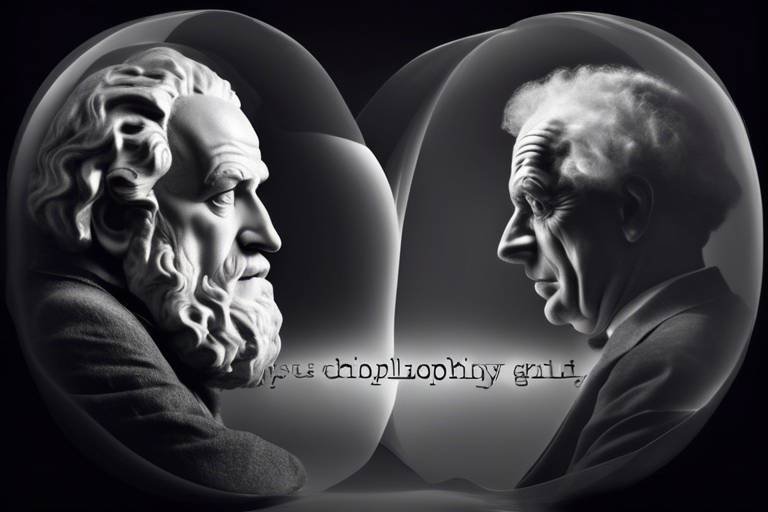Exploring Spinoza's Main Philosophical Ideas
Baruch Spinoza, a 17th-century philosopher, is often regarded as one of the most influential thinkers in Western philosophy. His ideas challenge conventional beliefs and offer a fresh perspective on the nature of reality, ethics, and the divine. In this article, we will delve into the core concepts proposed by Spinoza, examining how his radical views on God, nature, ethics, and the mind-body relationship have shaped modern philosophical discourse. By understanding Spinoza's philosophy, we can appreciate the depth of his contributions and their relevance to contemporary thought.
Spinoza redefined the concept of God in a way that was revolutionary for his time. He proposed a pantheistic view, suggesting that God is not a transcendent being separate from the universe but rather synonymous with nature itself. This perspective challenges traditional theism, which often portrays God as an anthropomorphic figure who intervenes in the world. Instead, Spinoza's God is immanent, meaning that everything in existence is a manifestation of the divine. This radical rethinking of God invites us to see the universe as a unified whole, where everything is interconnected and part of a greater reality.
At the heart of Spinoza's philosophy lies his metaphysical framework, which posits that all of existence is part of a single substance. This monistic view reshapes our understanding of reality, suggesting that rather than being a collection of separate entities, everything is interconnected. In Spinoza's view, this single substance is often referred to as "God or Nature" (Deus sive Natura). By embracing this idea, we can begin to see the world through a lens of unity and interconnectedness, challenging the dualistic perspectives that have dominated Western thought for centuries.
Spinoza introduces the concept of substance as the fundamental reality that underlies everything. He argues that this substance has infinite attributes, each expressing a different aspect of its essence. The two attributes most commonly discussed are thought and extension, representing the mental and physical realms, respectively. Understanding these attributes is crucial for grasping Spinoza's philosophical system, as they illustrate how the same underlying reality can manifest in diverse ways.
Attributes, in Spinoza's philosophy, refer to the different ways in which substance is perceived. For instance, when we think about the universe, we engage with it through the attribute of thought; when we experience the physical world, we engage through the attribute of extension. This duality allows us to comprehend the complexity of existence while recognizing that both attributes are part of the same fundamental substance. By appreciating this connection, we can deepen our understanding of God and nature, seeing them not as separate entities but as intertwined expressions of the same reality.
The implications of Spinoza's monism extend far beyond metaphysics; they influence ethics, psychology, and our understanding of the human experience. By asserting that everything is part of a unified substance, Spinoza encourages us to reconsider our place in the universe. This perspective fosters a sense of responsibility toward one another and the world around us. It raises profound questions about morality, as our actions can be seen as part of a larger tapestry of existence. In this light, ethical behavior becomes not just a personal choice but a reflection of our interconnectedness with all of reality.
One of the most significant aspects of Spinoza's philosophy is his view on the mind-body relationship. In contrast to Cartesian dualism, which separates the mind and body as distinct entities, Spinoza argues that they are two aspects of the same substance. This perspective suggests that our mental and physical experiences are not separate but rather interconnected. Understanding this relationship is crucial for grasping Spinoza's insights into human nature and the experience of consciousness. By recognizing that mind and body are two sides of the same coin, we can appreciate the holistic nature of our existence.
Spinoza's ethical framework is rooted in the idea of rational understanding and emotional well-being. He believed that true happiness arises from a deep comprehension of the world and our place within it. This approach to ethics emphasizes the importance of reason in guiding our actions and decisions. By cultivating rational thought, individuals can navigate the complexities of life and achieve a more fulfilling existence. Spinoza's philosophy serves as a guide for those seeking to lead a virtuous life, encouraging us to embrace our emotions while also understanding their role in our overall well-being.
Reason plays a central role in Spinoza's ethical framework. He posits that by using our rational faculties, we can gain insight into the nature of our emotions and desires. This understanding allows us to make informed decisions that align with our true interests and promote our well-being. Spinoza argues that emotional resilience stems from the ability to reason effectively, enabling individuals to respond to life's challenges with clarity and purpose. In this way, rationality becomes a powerful tool for achieving true happiness and fulfillment.
The concept of conatus is pivotal in Spinoza's understanding of human motivation. It refers to the innate drive for self-preservation and the desire to enhance one's existence. This principle underpins Spinoza's view of human behavior, suggesting that our actions are motivated by a fundamental urge to survive and thrive. By recognizing the role of conatus in our lives, we can better understand our motivations and ethical choices. This insight encourages us to cultivate behaviors that promote not only our own well-being but also the well-being of others, as we are all part of the same unified substance.
- What is Spinoza's view on God? Spinoza sees God as synonymous with nature, proposing a pantheistic view where everything is part of a single divine substance.
- How does Spinoza's philosophy differ from Cartesian dualism? Unlike Cartesian dualism, which separates mind and body, Spinoza argues that they are two aspects of the same substance.
- What role does reason play in Spinoza's ethics? Reason is central to Spinoza's ethics, guiding individuals toward rational understanding and emotional well-being.

Spinoza's Concept of God
Baruch Spinoza's view of God is nothing short of revolutionary. He takes the traditional notion of a personal, anthropomorphic deity and flips it on its head, presenting a radical concept that intertwines God with the very fabric of the universe. Instead of viewing God as a separate, transcendent being who intervenes in human affairs, Spinoza proposes a pantheistic perspective where God is synonymous with nature itself. This means that everything around us—from the smallest pebble to the vast cosmos—is a manifestation of the divine.
To grasp the depth of Spinoza's ideas, we must first understand what he means by "God." For him, God is not just an entity but the totality of existence. This leads to several profound implications:
- Unity of Existence: Spinoza argues that there is only one substance, which is God, and everything else is a mode of that substance. This challenges the dualistic view of God and the world, suggesting that they are inseparable.
- Immanence: In Spinoza's philosophy, God is immanent in the world, meaning that the divine is present in all things. This idea encourages a sense of reverence for nature and the universe, as everything is interconnected.
- Rejection of Miracles: Since God is synonymous with nature, the concept of miracles becomes problematic. For Spinoza, everything that happens is a part of the natural order, governed by the laws of nature rather than divine intervention.
This radical redefinition of God leads us to question our understanding of spirituality and existence. If God is not a distant figure observing us from above, but rather the very essence of the universe, how does that change our relationship with the divine? Spinoza encourages us to see God in the world around us, to find divinity in nature, and to seek understanding through reason rather than faith alone.
Moreover, Spinoza's concept of God has significant implications for ethics and morality. If we recognize that everything is part of a single substance, it fosters a sense of interconnectedness among all living beings. This perspective can lead to greater compassion and empathy, as harming another is, in essence, harming a part of the divine. By understanding our place within this grand scheme, we can cultivate a more ethical way of living that respects the unity of existence.
In summary, Spinoza's reimagining of God as synonymous with nature not only challenges traditional religious views but also invites us to explore a deeper, more meaningful connection with the universe. By embracing this pantheistic vision, we can find a sense of belonging and purpose in the intricate web of life that surrounds us.

The Nature of Reality
When we dive into Spinoza's metaphysical framework, we encounter a world that is both fascinating and complex. Spinoza posits that everything we see and experience is part of a single, unified substance. Imagine this substance as an expansive ocean—vast, deep, and interconnected—where every wave, drop, and ripple is a manifestation of the same water. This perspective, known as monism, reshapes our understanding of reality and existence in a way that challenges traditional views.
At the heart of Spinoza's philosophy is the idea that there is no separation between God and the universe. Instead of viewing God as an external creator who stands apart from creation, Spinoza argues that God is synonymous with nature itself. This radical redefinition invites us to rethink our relationship with the divine. If God is everything, then every leaf, every star, and every thought is a part of this divine fabric. It's a beautiful, yet humbling realization that we are not just observers of the universe but integral parts of it.
To unpack Spinoza's philosophy further, we need to understand the concepts of substance and attributes. Substance, in Spinoza's view, is the fundamental reality that exists independently. It's the essence of everything, the core of existence. Attributes, on the other hand, are the different ways in which we perceive this substance. Think of attributes as the various colors of light shining through a prism; each color reveals a different aspect of the same underlying light. For Spinoza, the most significant attributes are thought and extension, which correspond to the mind and body, respectively.
Attributes play a crucial role in how we grasp the nature of God and the universe. When we contemplate the attributes of substance, we are essentially exploring the different dimensions of existence. For instance, when we think about the attribute of thought, we engage with the realm of ideas, consciousness, and mental processes. Conversely, when we consider the attribute of extension, we delve into the physical world—everything that can be touched, seen, or measured. This duality is not a separation but rather two expressions of the same reality, reinforcing Spinoza's idea of unity.
The implications of Spinoza's monism extend far beyond metaphysics; they ripple through ethics, psychology, and even our understanding of human relationships. By embracing a unified substance, we begin to see that our actions, thoughts, and feelings are interconnected. This realization can profoundly affect our approach to life. For instance:
- Ethics: If everything is interconnected, our ethical decisions impact not just ourselves but the entire web of existence.
- Psychology: Understanding that mind and body are one can lead to a more holistic approach to mental health.
- Relationships: Recognizing our shared essence can foster empathy and compassion towards others.
In essence, Spinoza's view of reality invites us to reconsider our role within the grand tapestry of existence. It encourages us to live with a sense of interconnectedness, understanding that our actions resonate throughout the universe.
- What is Spinoza's view on God? Spinoza redefined God as synonymous with nature, promoting a pantheistic view.
- What does monism mean in Spinoza's philosophy? Monism is the idea that everything is part of a single substance, rejecting dualistic separations.
- How do attributes relate to substance? Attributes are the different ways we perceive the single substance, such as thought and extension.
- What are the implications of Spinoza's philosophy? His ideas influence ethics, psychology, and our understanding of human relationships by emphasizing interconnectedness.

Substance and Attributes
Baruch Spinoza's philosophy introduces us to the intriguing concept of substance, which he posits as the fundamental reality underlying everything that exists. To Spinoza, substance is not just an abstract idea; it's the very essence of existence itself. He famously asserts that there is only one substance, which he identifies with God or Nature (Deus sive Natura). This radical view challenges the traditional dualistic perspectives of reality, where God and the world are often seen as separate entities.
In Spinoza's framework, substance is characterized by its attributes, which are the different ways in which we can perceive it. He identifies two primary attributes: thought and extension. Thought refers to the mental realm, encompassing ideas, emotions, and consciousness, while extension pertains to the physical world, including matter and space. This duality does not imply a separation but rather highlights the interconnectedness of all that exists. Just like two sides of the same coin, thought and extension are inseparable aspects of the same substance.
To further understand this relationship, consider the following table that summarizes Spinoza's view on substance and its attributes:
| Attribute | Description |
|---|---|
| Thought | The realm of ideas, consciousness, and mental phenomena. |
| Extension | The physical realm, including all matter and spatial dimensions. |
This monistic perspective fundamentally reshapes our understanding of reality. Instead of viewing God as a distant creator, Spinoza invites us to see the divine as immanent within the world. This leads to a profound implication: everything that exists is a manifestation of the same substance. Whether it’s a tree, a human being, or a star, all are expressions of the singular reality that Spinoza describes.
Moreover, the implications of this view extend beyond metaphysics into ethics and psychology. By recognizing that we are all part of the same substance, Spinoza encourages a sense of unity and interconnectedness. This realization can foster empathy and compassion, as we come to understand that the struggles of others are, in a sense, our struggles too. In a world where everything is interconnected, the idea of individualism takes on a new dimension, prompting us to reconsider our place within the larger tapestry of existence.
In conclusion, Spinoza's ideas about substance and attributes challenge us to rethink our understanding of reality. By embracing the notion that everything is part of a single, unified substance, we can cultivate a deeper appreciation for the world around us and our connection to it. This philosophical outlook not only enriches our understanding of existence but also guides us toward a more ethical and harmonious way of living.
- What is Spinoza's definition of substance? Spinoza defines substance as the fundamental reality that underlies everything, identifying it with God or Nature.
- How do attributes relate to substance? Attributes are the different ways in which substance can be perceived, primarily thought and extension.
- What are the implications of Spinoza's monism? Spinoza's monism suggests that everything is interconnected, fostering empathy and ethical behavior.

Understanding Attributes
In the grand tapestry of Spinoza's philosophy, the concept of attributes plays a pivotal role, acting as the threads that weave together the intricate fabric of his metaphysical system. For Spinoza, attributes are not merely secondary characteristics; they represent the various ways in which the singular substance—often identified with God or nature—can be perceived and understood. Imagine trying to grasp the essence of a complex painting; you might focus on its colors, shapes, and textures, each offering a different perspective on the same artwork. Similarly, Spinoza's attributes provide us with diverse lenses through which we can explore the nature of existence.
Spinoza identifies two primary attributes: thought and extension. These attributes correspond to the mental and physical realms, respectively, suggesting that everything in the universe can be understood through these two dimensions. To put it simply, if you think of the universe as a giant clock, thought represents the inner workings—the gears and mechanisms—while extension embodies the clock's physical form—the wood, glass, and metal that make it tangible. This duality allows us to appreciate the depth of reality, reminding us that our understanding is shaped by the perspective we choose to adopt.
One of the most fascinating aspects of Spinoza's attributes is their interconnectedness. Each attribute reveals a different facet of the same underlying substance, reinforcing the idea that everything is fundamentally linked. This perspective challenges us to reconsider how we perceive distinctions between mind and body, encouraging a more holistic view of existence. In essence, by recognizing that attributes are expressions of the same substance, we can begin to see the world as a unified whole rather than a collection of disparate parts.
Furthermore, Spinoza's attributes lead us to a deeper understanding of our own existence. When we contemplate our thoughts, emotions, and physical sensations, we are engaging with the attributes of substance. This realization invites us to embrace our experiences fully, recognizing that they are all manifestations of the same underlying reality. As we navigate our lives, we can draw upon this understanding to cultivate a sense of connection with the world around us, fostering a more profound appreciation for the intricate interplay of mind and body.
In summary, Spinoza's exploration of attributes not only enriches our understanding of his philosophical system but also invites us to reflect on our own experiences. By recognizing the significance of thought and extension, we can appreciate the interconnectedness of all things, ultimately leading to a more profound understanding of ourselves and the universe. This holistic approach encourages us to see beyond surface-level distinctions, fostering a deeper sense of unity and harmony in our lives.

Implications of Monism
Spinoza's monism is not merely a philosophical abstraction; it carries significant implications that ripple through various domains of thought, including ethics, psychology, and metaphysics. By asserting that everything is part of a single substance, he challenges the dualistic frameworks that have historically dominated Western philosophy. This unified view of existence fosters a sense of interconnectedness, suggesting that all things—be they human, natural, or divine—are expressions of the same underlying reality.
One of the most profound implications of Spinoza's monism is its impact on our understanding of ethics. If everything is interconnected, then the actions of one individual inevitably affect others. This realization encourages a sense of responsibility and empathy, as we begin to see ourselves as part of a larger whole. In this light, ethical behavior becomes not just a personal choice but a necessity for the well-being of the community and the environment. As Spinoza himself noted, “The more we understand our emotions and the world around us, the better we can live in harmony with it.”
Moreover, Spinoza's monism reshapes our view of human emotions and motivations. By recognizing that our feelings are not isolated experiences but rather part of the broader tapestry of existence, we can cultivate a deeper understanding of ourselves. This perspective allows individuals to approach their emotions with greater clarity, leading to improved emotional resilience and mental health. In a world often characterized by fragmentation, Spinoza’s philosophy invites us to embrace our shared humanity.
In the realm of psychology, Spinoza's ideas offer valuable insights into the nature of the mind and body. By rejecting the Cartesian dualism that separates mental and physical states, he presents a more holistic understanding of human experience. This integrated view encourages a more comprehensive approach to mental health, emphasizing the importance of addressing both emotional and physical well-being. For instance, practices such as mindfulness and meditation resonate with Spinoza’s philosophy, as they promote awareness of the interconnectedness of thoughts, feelings, and bodily sensations.
Ultimately, the implications of Spinoza's monism extend beyond academic philosophy; they invite us to reconsider our place in the universe. The idea that we are all manifestations of a single substance can be both liberating and daunting. It challenges us to think about our relationships, our responsibilities, and our role in the grand scheme of existence. As we navigate the complexities of modern life, embracing Spinoza's vision can lead to a more harmonious and fulfilling existence.
- What is Spinoza's view on God? Spinoza redefined God as synonymous with nature, proposing a pantheistic perspective that sees everything as a manifestation of the divine.
- How does Spinoza's monism affect ethics? His monism encourages a sense of interconnectedness, suggesting that ethical behavior is essential for the well-being of both individuals and the community.
- What is the significance of the mind-body relationship in Spinoza's philosophy? Spinoza argues that mind and body are two aspects of the same substance, promoting a holistic understanding of human experience.
- How can Spinoza's ideas be applied in modern life? By embracing his philosophy, individuals can cultivate emotional resilience, improve mental health, and foster a greater sense of community.

Mind-Body Relationship
When we dive into the intricate waters of Spinoza's philosophy, one of the most captivating aspects is his perspective on the . Unlike the traditional Cartesian dualism that separates mind and body into distinct entities, Spinoza boldly proposes that they are actually two sides of the same coin. This revolutionary idea reshapes our understanding of human existence and our place in the universe.
Spinoza argues that both the mind and body are expressions of the same underlying substance, which he identifies with God or nature. This monistic view suggests that everything is interconnected, and the separation we often perceive is merely an illusion. Imagine a river flowing seamlessly; the water represents our mind and body, both part of the same current, yet appearing as distinct streams at different points. This analogy encapsulates Spinoza's belief that mind and body are not separate but rather two attributes of the same substance, influencing and reflecting each other.
In practical terms, this means that our mental states can affect our physical well-being and vice versa. For instance, when we experience anxiety, it can manifest physically through symptoms like increased heart rate or muscle tension. Conversely, physical activities such as exercise can lead to improved mood and mental clarity. Spinoza's insights encourage us to recognize this profound connection and to understand that nurturing one aspect can enhance the other.
Furthermore, Spinoza's philosophy invites us to reconsider the nature of emotions. He posits that emotions are not merely irrational disturbances but are instead integral to our being. They arise from the interactions between our mind and body, shaped by our experiences and perceptions. By understanding our emotions rationally, we can attain a greater sense of control over our lives. This leads us to the idea of emotional resilience, where we learn to navigate our feelings with intelligence and awareness, rather than being swept away by them.
To illustrate this relationship further, consider the following table that outlines key differences between Cartesian dualism and Spinoza's monism:
| Aspect | Cartesian Dualism | Spinoza's Monism |
|---|---|---|
| Nature of Mind and Body | Separate entities | Two attributes of the same substance |
| Interaction | Mind influences body and vice versa | Interconnected expressions of a single reality |
| Understanding of Emotions | Often seen as irrational | Integral to rational understanding |
| Implications for Ethics | Focus on moral reasoning | Emotions play a crucial role in ethical behavior |
In summary, Spinoza's view of the mind-body relationship challenges us to rethink how we perceive ourselves and our interactions with the world. By acknowledging the unity of mind and body, we can cultivate a deeper understanding of our emotions and ultimately lead a more fulfilling life. This interconnectedness not only enhances our personal well-being but also enriches our relationships with others, as we begin to see the shared essence that binds us all.
- What is Spinoza's view on the mind-body relationship? Spinoza believes that the mind and body are two attributes of the same substance, suggesting they are interconnected rather than separate entities.
- How does this relationship affect our emotions? According to Spinoza, emotions arise from the interaction between mind and body, and understanding them rationally can lead to greater emotional control.
- What implications does this have for ethics? Spinoza's view emphasizes that emotions are integral to ethical behavior, encouraging a more holistic approach to understanding human motivation.

Ethics and Human Emotions
Baruch Spinoza's philosophy offers a unique lens through which we can examine ethics and human emotions. Unlike many philosophers who approached ethics from a purely moral standpoint, Spinoza integrated the understanding of emotions into his ethical framework. He believed that our emotions are not just fleeting feelings but are deeply intertwined with our rationality and ethical decisions. This perspective invites us to consider how our emotional states influence our actions and moral choices.
At the heart of Spinoza's ethical framework is the idea that reason plays a pivotal role in navigating our emotions. He argued that by understanding our emotions rationally, we can transform them into something constructive rather than destructive. This process of rational understanding allows individuals to achieve a state of true happiness, which Spinoza defined not merely as pleasure but as a deeper sense of fulfillment and virtue. In his view, emotions can either lead us to greater understanding and connection with others or can entrap us in cycles of despair and conflict. The choice lies in how we engage with our emotions.
Spinoza identified several key emotions and categorized them into positive and negative feelings. Positive emotions, such as love and joy, arise from a rational understanding of our place in the universe and our connection to others. Conversely, negative emotions, like hatred and envy, stem from misunderstanding and a lack of knowledge about ourselves and the world around us. This distinction is crucial because it highlights Spinoza's belief that ethical living is about cultivating positive emotions through reasoned understanding.
One of the most fascinating aspects of Spinoza's philosophy is his concept of conatus, which refers to the innate drive for self-preservation. This drive is not merely about survival; it encompasses the desire to thrive and achieve our fullest potential. Spinoza believed that this principle underpins human motivation and ethical behavior. When we act in accordance with our true nature and strive for self-improvement, we align ourselves with the greater good. Therefore, ethical behavior, in Spinoza's view, is inherently tied to our emotional well-being and our pursuit of self-preservation.
To illustrate Spinoza's ideas on ethics and emotions, consider the following table that outlines the relationship between emotions, reason, and ethical behavior:
| Emotion Type | Example | Impact on Ethics |
|---|---|---|
| Positive | Love | Encourages altruism and connection |
| Negative | Hatred | Leads to conflict and ethical dilemmas |
| Transformative | Fear | Can motivate ethical action when understood |
In summary, Spinoza's approach to ethics and human emotions emphasizes the importance of understanding our emotional lives through the lens of reason. By recognizing the interplay between our emotions and ethical behavior, we can navigate our lives with greater awareness and intention. This understanding not only enriches our personal lives but also fosters a more compassionate and ethical society. As we embrace this philosophy, we may find ourselves more capable of cultivating positive emotions and making ethical choices that reflect our true selves.
- What is Spinoza's view on emotions?
Spinoza believed that emotions are integral to our ethical decisions and can be understood through reason. - How does Spinoza define happiness?
Happiness, for Spinoza, is not just pleasure but a deeper sense of fulfillment achieved through rational understanding. - What role does conatus play in Spinoza's ethics?
Conatus is the drive for self-preservation that influences human motivation and ethical behavior.

The Role of Reason
In the intricate tapestry of Spinoza's philosophy, reason emerges as a vital thread, weaving together the fabric of ethics and human emotions. For Spinoza, reason is not merely a tool for logical deduction; it is the key to unlocking true happiness and understanding our place within the universe. Imagine standing at the edge of a vast ocean, where the waves of emotion crash against the shore of our consciousness. Without reason, we are swept away by the tumultuous tides of our feelings, but with it, we can navigate these waters with clarity and purpose.
Spinoza posits that through the exercise of reason, individuals can rise above the chaos of their emotional responses. He argues that emotions, or affects, are not inherently good or bad; rather, they are natural responses to our experiences. However, when we engage our rational faculties, we can analyze these affects, understand their origins, and ultimately gain control over them. This process is akin to being a skilled sailor who knows how to harness the wind rather than being tossed about by it.
The implications of this perspective are profound. By employing reason, we can transform our emotional experiences into opportunities for growth and self-improvement. Spinoza believed that the more we understand our emotions through reason, the more we can cultivate a state of inner peace and emotional resilience. This leads to a more fulfilling life, where our decisions are not dictated by fleeting passions but rather by a deeper understanding of our desires and motivations.
To illustrate this idea further, consider the following table that summarizes the relationship between reason and emotion in Spinoza's ethical framework:
| Aspect | Reason | Emotion |
|---|---|---|
| Nature | Logical and analytical | Instinctive and reactive |
| Function | Guides ethical decision-making | Reflects personal experiences |
| Outcome | Facilitates self-understanding | Can lead to confusion if unchecked |
In essence, Spinoza's emphasis on reason serves as a compass, guiding us through the complexities of our emotional landscape. By fostering a rational approach to our feelings, we can cultivate a life that is not only virtuous but also rich in understanding and fulfillment. It challenges us to ask ourselves: Are we allowing our emotions to dictate our actions, or are we harnessing the power of reason to steer our lives in a direction that aligns with our true values?
Ultimately, Spinoza invites us to embrace reason as a transformative force in our lives. It is through this lens that we can achieve a harmonious existence, where our emotional experiences become stepping stones toward greater wisdom and ethical living. So, the next time you find yourself overwhelmed by your feelings, remember Spinoza’s wisdom: pause, reflect, and let reason illuminate your path.
- What is the main idea behind Spinoza's philosophy?
Spinoza's philosophy centers around the idea of a single substance, where God and nature are one, emphasizing rational understanding and the interconnectedness of all things.
- How does Spinoza view emotions?
Spinoza sees emotions as natural responses that can be understood and managed through reason, allowing individuals to achieve emotional resilience and ethical living.
- What role does reason play in achieving happiness according to Spinoza?
Reason is crucial for understanding our emotions and making informed decisions, which ultimately leads to a more fulfilling and virtuous life.

Conatus and Self-Preservation
In the realm of Spinoza's philosophy, the concept of conatus stands out as a pivotal idea that encapsulates the essence of human motivation. Derived from the Latin word meaning "effort" or "striving," conatus refers to the innate drive within every being to persist in its own existence. For Spinoza, this drive is not merely a biological instinct; it is a fundamental aspect of our being that shapes our actions, desires, and ultimately, our ethical framework.
The notion of self-preservation is intricately linked to conatus, as it represents the primary goal of all individuals. Imagine a plant reaching towards the sun or a river carving its way through the landscape—these are manifestations of conatus, striving to fulfill their nature and survive. For humans, this drive manifests itself in various forms, including the pursuit of happiness, relationships, and personal growth. Spinoza posited that understanding this drive can lead to a more profound comprehension of our emotions and ethical decisions.
One of the fascinating aspects of conatus is that it does not operate in isolation. Rather, it interacts with the world around us, influencing and being influenced by external factors. Spinoza believed that our conatus is shaped by our experiences, relationships, and the society we inhabit. This interconnectedness highlights the importance of social and environmental contexts in shaping our motivations. For instance, when we engage in healthy relationships, our conatus is strengthened, leading to a more fulfilling and virtuous life.
Moreover, Spinoza's emphasis on reason plays a crucial role in harnessing the power of conatus. He argued that through rational understanding, individuals could better align their actions with their innate drive for self-preservation. This alignment not only fosters personal well-being but also cultivates emotional resilience. When faced with challenges, those who understand their conatus are more likely to respond with clarity and purpose, rather than being swept away by irrational fears or desires.
To further illustrate the significance of conatus in ethical behavior, consider the following table that outlines how conatus influences various aspects of human life:
| Aspect of Life | Influence of Conatus |
|---|---|
| Personal Relationships | Strengthens bonds and fosters emotional support |
| Career Aspirations | Drives ambition and pursuit of fulfillment |
| Mental Health | Promotes resilience and coping mechanisms |
| Ethical Decision-Making | Encourages alignment of actions with core values |
In conclusion, the concept of conatus is not just a philosophical abstraction; it is a practical framework that helps us navigate the complexities of life. By recognizing our innate drive for self-preservation and understanding its implications, we can cultivate a life that is not only fulfilling but also virtuous. Spinoza's insights encourage us to embrace our conatus, allowing it to guide our actions and decisions in a way that harmonizes with our true nature.
- What is conatus in Spinoza's philosophy? Conatus refers to the innate drive for self-preservation and the striving to exist and thrive.
- How does conatus influence ethical behavior? Conatus shapes our motivations and actions, guiding us toward decisions that align with our core values and enhance our well-being.
- Can understanding conatus improve mental health? Yes, recognizing and embracing our conatus can promote emotional resilience and healthier coping mechanisms.
- Is conatus only relevant to humans? No, conatus is a universal principle that applies to all beings, reflecting their inherent drive to exist and flourish.
Frequently Asked Questions
- What is Spinoza's concept of God?
Spinoza redefined God as synonymous with nature, proposing a pantheistic view that challenges traditional theism. He argued that everything in the universe is a manifestation of the same divine substance, leading to a radical understanding of existence.
- How does Spinoza view the nature of reality?
In Spinoza's philosophy, reality is understood through a metaphysical framework where everything is part of a single substance. This monistic perspective reshapes our understanding of existence, suggesting that all things are interconnected and part of a greater whole.
- What are the implications of Spinoza's monism?
The implications of Spinoza's monism are profound, affecting various fields such as ethics, psychology, and metaphysics. It suggests that understanding the unity of substance can lead to deeper insights into human behavior and ethical decision-making.
- How does Spinoza explain the mind-body relationship?
Spinoza challenges the Cartesian dualism by proposing that the mind and body are two aspects of the same substance. This connection emphasizes that our mental states and physical states are interrelated, influencing each other in significant ways.
- What role does reason play in Spinoza's ethics?
Reason is central to Spinoza's ethical framework, as it enables individuals to achieve true happiness. By understanding and applying reason, people can make informed ethical decisions and cultivate emotional resilience.
- What is the concept of conatus in Spinoza's philosophy?
Conatus refers to the innate drive for self-preservation that Spinoza believes is fundamental to human motivation. This principle underpins his understanding of ethical behavior, suggesting that individuals are naturally inclined to seek their own well-being.



















